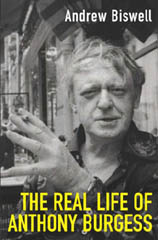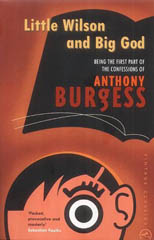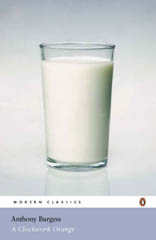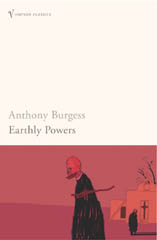Anthony Burgess
The Real Life of Anthony Burgess
 Not an official or authorised biography, and only the second to appear since Burgess’s death in 1993, Andrew Biswell’s sympathetic study of Burgess presents him neither as Saint Anthony nor as Sinner Wilson, but somewhere between the two. Anthony Burgess was born John Burgess Wilson, but did not assume his pen-name until 1955. Biswell informs us that ”Anthony’ was the name he had taken at his first confession.’ Unless my Catholic co-religionists do things differently in Lancashire, I think Biswell surely means ‘confirmation’ and not ‘confession.’
Not an official or authorised biography, and only the second to appear since Burgess’s death in 1993, Andrew Biswell’s sympathetic study of Burgess presents him neither as Saint Anthony nor as Sinner Wilson, but somewhere between the two. Anthony Burgess was born John Burgess Wilson, but did not assume his pen-name until 1955. Biswell informs us that ”Anthony’ was the name he had taken at his first confession.’ Unless my Catholic co-religionists do things differently in Lancashire, I think Biswell surely means ‘confirmation’ and not ‘confession.’
A hugely prolific writer, both as novelist and reviewer, Burgess also wrote two volumes of autobiography, Little Wilson and Big God and You’ve Had Your Time. Given his consummate skills as a writer and his original creative powers, it is sometimes difficult to separate Burgess’s wilder claims about his life from what actually happened. With great diligence and greater tact, Biswell takes on the responsibility of unravelling the fictions from the facts, or, as he puts it, ‘Burgess’s harmless tendency to misremember the events of his own past for comic or dramatic effect.’ This tendency, we learn, was nothing compared to Burgess’s fondness for the events or details of other people’s lives, which he would transfer  unadulterated into his novels. Biswell writes, perhaps a tiny bit indulgently, that ‘Burgess simply didn’t understand what libel was, and therefore had little idea how to avoid it.’ Even when writing unsigned book reviews for the TLS, Burgess had this ‘propensity to introduce something libellous into his copy,’ which then had to be dealt with. Knowing of its author’s ‘problem’, Heinemann had to employ a lawyer to compile a libel report on Little Wilson and Big God.
unadulterated into his novels. Biswell writes, perhaps a tiny bit indulgently, that ‘Burgess simply didn’t understand what libel was, and therefore had little idea how to avoid it.’ Even when writing unsigned book reviews for the TLS, Burgess had this ‘propensity to introduce something libellous into his copy,’ which then had to be dealt with. Knowing of its author’s ‘problem’, Heinemann had to employ a lawyer to compile a libel report on Little Wilson and Big God.
Biswell describes many instances of these Burgessian misrememberings; whether the ‘public and private fantasising’; his ‘anxiousness to claim grand ancestors’; or ‘his reluctance to tell a story the same way twice.’ About one episode, he baldly writes, ‘many of those who knew Burgess later have expressed surprise or disbelief at the account of his extensive erotic activities throughout the war.’ After identifying each misremembering – ‘although this anecdote is entertainingly narrated, it has little basis in fact’ – Biswell comments on it good-naturedly and corrects it sympathetically, so presenting Burgess as the likeable human that he surely quite often must have been: one former student remembers his old tutor as ‘a friendly, sociable person with a fine command of words… The John Wilson we knew was a more likeable character than the persona of Anthony Burgess which he became and in the cloak of which, from time to time, he flickered across our TV screens. A rather better person than perhaps he gives himself credit for in his autobiography.’ This is in marked contrast with the antics of the other persona: ‘embroiling himself in energetic disputes with literary agents, literary editors, film producers, book reviewers, passport offices, the Arts Council and the Inland Revenue’. (A man after my own heart.) But these opposites of character or temperament reflect in some ways the tensions between the Augustinian teachings about original sin and the more attractive but ultimately heretical features of Pelagianism. A lapsed Catholic for the greater part of his life, Burgess was still hopelessly drawn to explore these opposing theologies in many of his novels. Despite his rejection of Catholicism, it is difficult for me to think of Burgess as other than a Catholic novelist.
 One grouch: Biswell is, I think, a little unkind to David Daiches, who reviewed Burgess’s ‘sort of epic poem’ on the ‘life, birth and death of Moses’ in a much shorter poem of his own in the TLS. I cannot agree that Daiches’s review was dismissive. He wrote generously about the poem, regarding Burgess’s work as ‘Interesting, then; commendable, even: a bit of a sport/In the garden of modern poetry. But none the worse for that.’ While there was probably no other English writer so adventurous as to undertake the life of Moses in verse, or for that matter so original as to write A Clockwork Orange, or so inspired as to create Abba Abba, there was arguably no one better qualified in the academic community or literary fraternity in the UK (or elsewhere) than David Daiches to offer an assessment of Burgess’s work.
One grouch: Biswell is, I think, a little unkind to David Daiches, who reviewed Burgess’s ‘sort of epic poem’ on the ‘life, birth and death of Moses’ in a much shorter poem of his own in the TLS. I cannot agree that Daiches’s review was dismissive. He wrote generously about the poem, regarding Burgess’s work as ‘Interesting, then; commendable, even: a bit of a sport/In the garden of modern poetry. But none the worse for that.’ While there was probably no other English writer so adventurous as to undertake the life of Moses in verse, or for that matter so original as to write A Clockwork Orange, or so inspired as to create Abba Abba, there was arguably no one better qualified in the academic community or literary fraternity in the UK (or elsewhere) than David Daiches to offer an assessment of Burgess’s work.
Perhaps Biswell takes his side-swipe at Daiches because in the year that Daiches chaired the Booker Panel, it was William Golding’s Rites of Passage that took the Prize, rather than Burgess’s Earthly Powers. (According to other sources, Burgess regarded the Booker as small beer, and is  reported to have said, ‘what’s £10,000 to a millionaire’, and dismissed the entire show as ‘one of those silly, little British games.’) But no one knows for sure what were the discussions, deliberations and byzantine voting practices of any of the Booker Panels. The great deeps of the Booker Archive at Oxford Brookes University remain for the time uncharted; their treasures are still to be revealed.
reported to have said, ‘what’s £10,000 to a millionaire’, and dismissed the entire show as ‘one of those silly, little British games.’) But no one knows for sure what were the discussions, deliberations and byzantine voting practices of any of the Booker Panels. The great deeps of the Booker Archive at Oxford Brookes University remain for the time uncharted; their treasures are still to be revealed.
In acknowledging Burgess as an original, creative writer and a powerfully literary force, and choosing not to shy away from the manifold ‘misrememberings’ he purveys in his autobiographical accounts, Biswell displays all the marks of a good biographer and achieves, I think, the right balance, writing neither uncritically nor without a degree of empathy.
Biswell’s account of the life and times of Anthony Burgess reads in parts like a picaresque novel – the philandering; the boozing; the heavy smoking and the even heavier writing; the reviewing; the marryings (he and his first wife married each other thrice – first in a civil ceremony, then in a Welsh Protestant church, then finally according to the Catholic rite); and all the libels, whether intended or not – Robert Graves, Marghanita Laski, ‘Crusty Bustin’, Gilbert Christie, et al. The life, after all, does inform the writing, and Biswell devotes equal discussion to Burgess’s writing in all its manifestations as he does to his hero’s activities off the page.
The Real Life of Anthony Burgess, Andrew Biswell, Picador (ISBN 0330481703 HBK £20)
© Michael Lister 2006

Comments